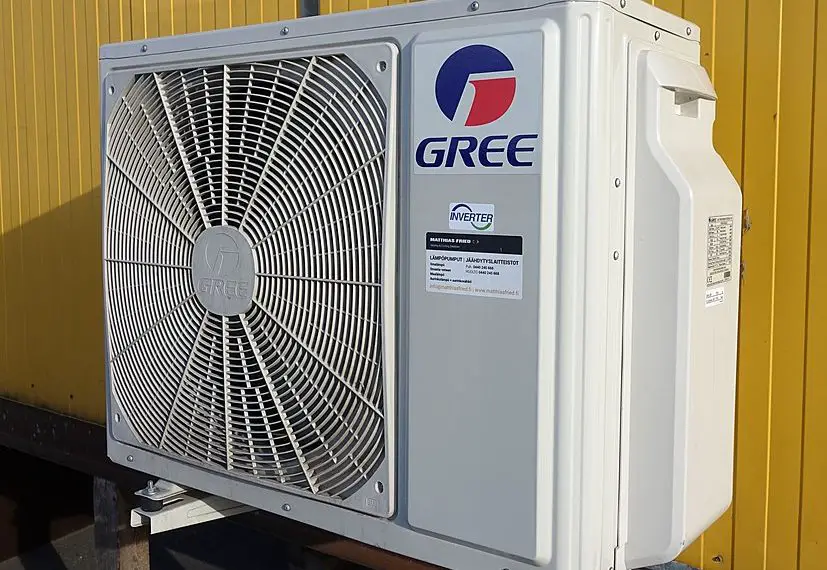Is your inverter AC not cooling like it used to? In this article, we’ll guide you through troubleshooting and preventive measures.

Table of Contents
Troubleshooting Inverter AC Not Cooling
Do the following to troubleshoot your inverter AC if it is not cooling.
Inspect the Filter
When was the last time you checked your AC filter? A clogged or dirty filter can significantly hinder your AC’s cooling performance. Clean filters are essential for maintaining good airflow and preventing dust from clogging the inner workings of your AC.
Luckily, checking and cleaning the filter is a breeze! Simply remove the filter, give it a good clean, and pop it back in. Experts recommend doing this at least once a month during peak usage.
Check the Refrigerant Level
Low refrigerant levels are a common culprit behind poor cooling performance. The refrigerant is the lifeblood of your AC, responsible for absorbing heat from your home and releasing it outside. Signs of low refrigerant levels include uneven cooling, ice buildup on the coils, and a hissing sound from the AC.
Checking the refrigerant level is a job best left to professionals, so if you suspect this may be the issue, give your local HVAC expert a call.
Examine the Condenser Unit
The condenser unit is the outdoor component of your AC system, responsible for releasing the heat absorbed from your home. A well-functioning condenser unit is vital for your AC’s cooling performance.
Clean the Condenser Coil
Over time, dirt and debris can accumulate on the condenser coil, reducing its efficiency and hindering heat dissipation.
To clean the coil, first, turn off the power to your AC unit. Then, use a soft brush or a gentle stream of water to remove any dirt or debris. Be sure to clean the coil at least once a year for optimal performance.
Check the Condenser Fan
The condenser fan helps dissipate heat from the condenser coil. If the fan isn’t functioning properly, your AC’s cooling performance will suffer. Signs of a malfunctioning fan include strange noises, slow or no rotation, and visible damage.
Inspect the fan for debris or damage and, if necessary, call a professional to fix or replace it.
Assess the Evaporator Coil
The evaporator coil, located inside the indoor unit, absorbs heat from the air in your home. A dirty or damaged evaporator coil can lead to poor cooling performance.
To clean and maintain the coil, you can use a soft brush or a no-rinse coil cleaner. Make sure to clean the coil at least once a year to keep your AC running smoothly.
Inspect the Thermostat
The thermostat plays a crucial role in maintaining your desired temperature. A faulty thermostat can result in uneven cooling or a complete lack of cooling.
To test your thermostat, adjust the temperature setting and listen for the AC to turn on or off. If the AC doesn’t respond as expected, you may need to replace the thermostat.
Evaluate the Compressor
The compressor is the heart of your AC system, responsible for circulating the refrigerant between the indoor and outdoor units. If the compressor is malfunctioning, your AC may not cool effectively.
Common compressor issues include overheating, electrical problems, and mechanical failure. Diagnosing and addressing compressor problems should be done by a professional HVAC technician.
Check out these other related articles…
1-Ton Inverter AC: Your Ultimate Guide
Inverter AC Power Consumption Calculator: The Ultimate Guide
Inverter AC Hot and Cold: Your Guide to Year-Round Comfort
Can Inverter AC Run on Inverter? A Comprehensive Guide
Can Inverter AC Universal PCB Revolutionize Home Cooling?
Preventive Measures to Ensure Optimal Cooling
How can you prevent this problem from happening again? Here are a few things you can do.
Regular Maintenance
Regular maintenance is key to keeping your inverter AC running at peak performance. This includes cleaning or replacing filters, checking refrigerant levels, and inspecting components for wear and tear. Scheduling professional maintenance services at least once a year can help you avoid potential issues and keep your AC running efficiently.
Proper Installation
Correct installation plays a significant role in the cooling performance of your inverter AC. To ensure a proper installation, hire a reputable professional installer with experience working with inverter AC systems. They’ll make sure your AC is installed correctly, optimizing its performance from day one.
Energy Efficiency Tips
Energy efficiency isn’t just about saving on your utility bills – it also affects your AC’s cooling performance. To optimize energy use, consider installing a programmable thermostat, using energy-efficient window treatments, and sealing any air leaks in your home. Additionally, investing in energy-efficient components for your AC system can contribute to better cooling performance and long-term savings.
